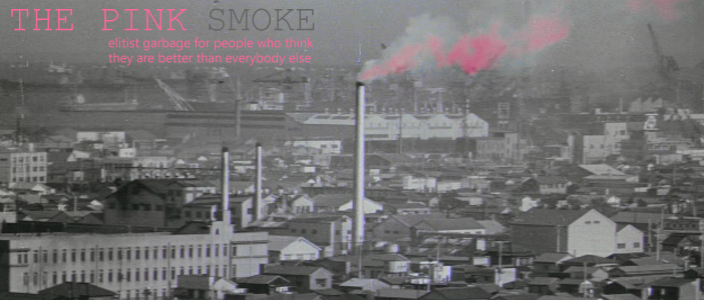
Ingmar Bergman's THE SERPENT'S EGG
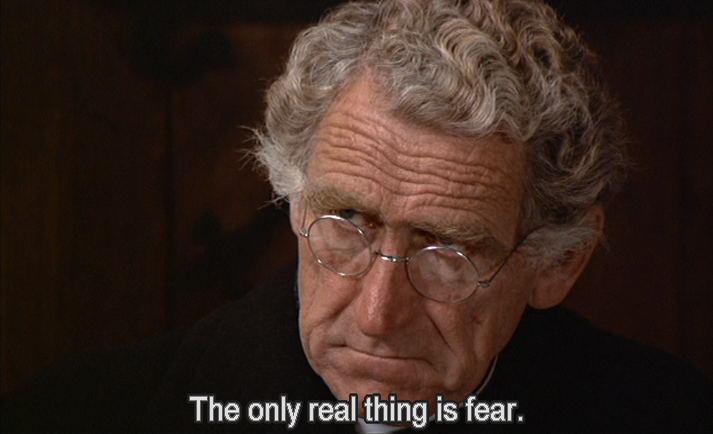
an outcast in the room of dreams: frustrating filmographies #8, page 3
Bergman certainly didn't feel that way in 1976 - here he was, one of the most respected and successful film directors in the world, and a slight political machination by the Swedish government had effectively, in his mind, undermined everything he'd accomplished materially and creatively. It's unlikely that, deep down, Bergman honestly thought his government was out to get him by besmirching his good name and getting him to flee the country. But he did fancy himself an untouchable artistic genius, and finding that he was hardly immune to the will of the ruling power must have influenced the characterization of Abel, who spends most of the film in a numbed indifference at the atrocities occurring all around that don't directly effect him. Again, it's the arrogance of the untouchable artist who considers himself above the problems of society; at one point Abel, pretending not to be interested in the anti-semitic propaganda a friend of his reads aloud from the newspaper, insists that, "I swing on my trapeze...I don’t believe all that political bunkum." As Janet Karsten Larson reported in her 1978 article The Birth of Evil: Genesis According to Bergman, in the years following his minor affiliation with the Nazi Party the director claimed he "did not vote or read a single political article. 'I'm an artist,' he told himself: 'I belong to the world.'" Larson surmises that "Bergman's recent troubles with Sweden's monolithic tax bureaucracy seem to have reminded him that the world he belongs to is very much a political place. In earlier works Bergman had not ignored the political, but in Serpent's Egg he spreads before us a most ambitious cinematic tapestry in which politics and the aesthetic impulse are interwoven with the world's woe."
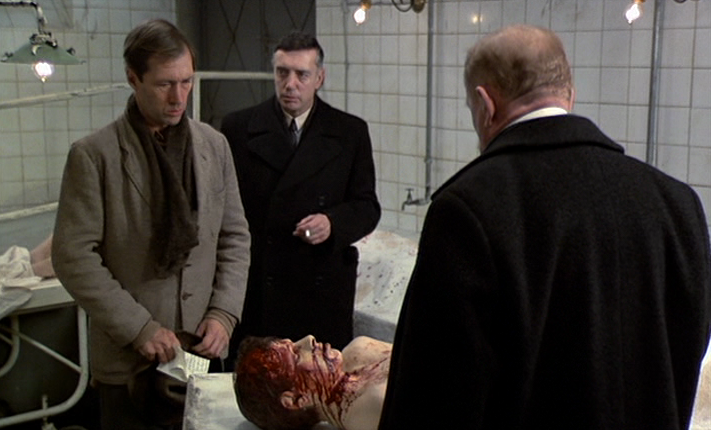
In this case, it wasn't enough for Bergman to simply surrogate his own perceived political bullies with treacherous informers and one-note Nazi thugs. Throughout the film, the arcane threats that hang over Abel are mostly mundane portents of future atrocities: members of the New Fatherland League assaulting a Jewish couple who then turn on Abel, a lecherous old landlady who spies on Abel and Manuela,* a faceless assassin who becomes literally faceless after a scuffle with Abel ends with the man's head being shoved under a descending elevator. While these arbitrary demons alternate between effectively creepy and obscenely cheesy (their scenes have got to be a big part of what people hate most about the film), the movie's more obscure sense of menace emanates from Vergérus' own ambitious tapestry. When a flustered Inspector Bauer leads Abel through the morgue, unveiling one mutilated body after another, neither realizes they're walking through a macabre art gallery of Vergérus' victims; Bauer, who doesn't understand art, appears particularly unmoved by the ghastly spectacle.** For Vergérus' counterpart in The Magician, the science of autopsy is expressly antithetical to the art of magic, but in the Serpent's Egg mortuary mortality and transcendence have been perversely mingled with one another, science in service of art and vice versa. The Bergman antagonist has become more creative and therefore more formidable - he can't be defeated with magic tricks because he's adopted the 20th century's biggest and best magic trick. And if Abel is overwhelmed at the casualness with which Bauer presents each casualty of Vergérus' grand design, he's irreparably devastated when faced with the finished project in the form of moving images on a screen. And although Manuela is guilty of a similar apathy - criticized for living "as if all the terrible things going on around us didn't concern her" - she can't hear the sound of the engine that's slowly driving Abel insane, the engine linked to the abstract idea of unrest and rebellion in the demoralized German people as a manufactured thing. The audience never hears it either, although once he's confronted Vergérus there doesn't seem to be any doubt that what so unnerved Abel was the distorted sound of a film projector.
As I've said, Bergman has a clear affinity with Vergérus, the man manipulating everyone from behind the scenes (he's even introduced observing a performance backstage at the cabaret), yet he also shares Abel's revulsion at the unveiling of Vergérus' film. This wouldn't be the last time Bergman suggested the potential within his rationalist villain to create beautiful art - the sadistic Bishop Vergérus plays a mean violin in Fanny and Alexander - but it's the first time one of his sketchy authority figures utilizes that ability towards his own malignant ends. Bergman was nearing 60 when he shot Serpent's Egg: a decade earlier he was content to relegate himself to being just one of the ants in the snakeskin trying to forge daring new directions in the ever-changing art of film; ten years and one federal prosecution later even that analogy must have started to seem feeble. Because he anticipated, as an aging artist, being phased out of cultural relevance as the medium progressed, his problems with the government had to have been an irresistible opportunity for Bergman to remove himself from a company built on his artistic success in the midst of a ministry famed for its immutable bureaucracy. The director's dread over the idea of suddenly becoming irrelevant or unproductive was realized in Vergérus, who despite his sociopathic devotion to a fiendish political agenda creates something from real situations, real people and real suffering - one big poisonous performance piece - thus commissioning the tools of art and philosophy to play a part in its own defeat. His "ideological experiments" are a corruption of artform, conforming to the rational, the political, the ruthlessly reformist concepts which Vergérus refers to as "necessary and logical development." Vergérus is the only character with any kind of progressive vision, spectacular and horrific, one that will sweep away what came before as unimpededly as Hitler's eventual conquest of the country. After all, Hitler himself was once an aspiring artist - a failed artist, but as we're reminded by Bergman's film he didn't exactly hit the ground running in the coup department either. It will be several years before he becomes the snake, just as all the leaders and shakers of the real world, the politicans and historical figures, viral and virile in a way that even the most celebrated artist could never hope to be. It's all an ineffectual artist can do to hope that the cabaret where he works won't be looted, the authorities won't confiscate his horses, the Swedish government won't arrest him for tax evasion. And the best an antiquated collective of artists like the troupe in The Magician or circus team in Sawdust and Tinsel can hope to constitute is a bunch of ants, giving a snakeskin the semblance of life without actually moving.
Bergman even seems to have seen The Serpent's Egg itself as a failure of the "frantic artist beneath the snakeskin": "The movie does not tire for a moment: rather the opposite. It is overstimulated, as if it had taken anabolic steroids. But its vitality is powerful on a superficial plane; the failure is hidden underneath."
Now I'm willing to concede it may have all been a coincidence: Bergman had been planning the project with De Laurentiis long before his arrest and self-exile, so the egg of The Serpent's Egg was not necessarily laid by his tax ordeal. But there's no reason not to suspect that Bergman, having been half-nudged off his sizable metaphorical trapeze, brought the experience of his humiliation to the film - it ties in so perfectly with his themes of artistic humbling, of the oppressive, empty world against the individual, the angst of Ingmar Bergman the Hunger Artist. Like the couple who each secretly wishes to abandon the circus in Sawdust and Tinsel, the auteur was no doubt having doubts about continuing in a shifting environment where interest in his work might appeared to him to have markedly diminished. That's at least suggested by his change of aesthetic in Egg, seeking to bring his city to life by emulating the films of Andrei Tarkovsky, who according to Bergman "moves with such naturalness in the room of dreams." Tapping into a Tarkovskian-dreamworld to translate his own fantastic imagery was another acknowledged boner on Bergman's part - "All my life I have hammered on the doors of the rooms in which (Tarkovsky) moves so naturally. Only a few times have I managed to creep inside. Most of my conscious efforts have ended in embarrassing failure - The Serpent's Egg, The Touch, Face to Face and so on."*** - though the effort at least implies that the production of Egg wasn't half-assed. It's hard not to view the almost out-of-place scene with James Whitmore's priest, who asks Manuela for forgiveness for his "apathy and indifference," as Bergman apologizing to the audience for not being fully invested in the film's production, and to Liv Ullmann for putting her in the movie in the first place. In the world of Bergman god may have abandoned his children, but god forbid the director ever deliberately abandon his audience.
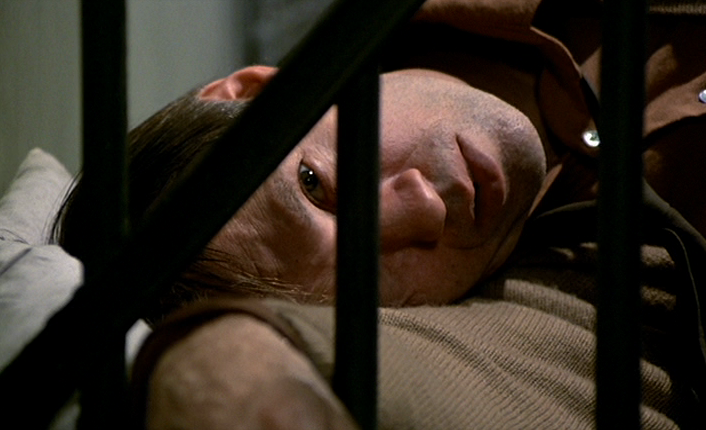
Because Bergman - the man of the theater, the common whore - loved opening himself up as an artist before his audience, acceding his own flaws; it's often the feeling that watching one of his films, if you glanced over your shoulder, you'd find a gaunt old Swedish man dejectedly gauging your reaction. But at the same time he was obliged to play the part of the artist in mortal trouble, prompting his hasty exfiltration to the city that may very well have killed Kafka. Like Kafka, Bergman understood that real humiliation is two-fold: there has to be an outside tormenter as well as an inherent tendency within the artist towards self-defeat. Serpent's Egg is full of self-punishing artists: Max asks to take the Thanotoxin even though he knows what its effects will be (then shoots himself), Manuela comes back to the clinic even though she knows what goes on there and, assumedly, what it did to Max (then kills herself), and Abel shatters a shop window when he sees his name on it, inadvertently setting off a hate crime against the Jewish couple who own it.**** In the end, Bauer offers to send Abel to the circus in Easel, back to his art, yet Abel flees from it, like Bergman from Sweden, to be, as the closing narration states, "never seen again." If Bergman really did see The Serpent's Egg as a permanent uprooting and abandonment of his 32-year career in his home country (not to mention the abandonment of his company, which resulted in the loss of millions of dollars and hundreds of workers being laid off), it's most evident in Manuela's Berlin address, 35 Bergmannstrasse - the director was looking to stake a claim in a new geographic and aesthetic arena away from the tenacious serpent that was Sweden's tax agency.
However in a film that fuses its director's excitement and fear of the future into one cinematic ball of uncertainty, there's evidence of Bergman yearning for the very past he seemed convinced to have left behind. We never see Abel enter his own new home at a boardinghouse belonging to "Frau Hemse": the first time he's stopped at the doorstep at the sight of his brother's dead body, the second he's cut off by the cops who come to take him to the morgue. Hemse is a locality of Gotland, Sweden's largest island which lies directly south of Fĺrö, Bergman's old stomping ground (The Touch was filmed in Visby, Gotland's capital). Here Bergman once again connects with Abel, a stranger to the city who finds he isn't even permitted to go back to the place he's staying in the city and is frequently frustrated by the elusiveness of the past: seeing his dead brother, sharing memories of his mother who died of lung disease in Amalfi with Manuela, gazing uneasily at a body in the morgue who looks much like his late father (the corpse is actually a cameo by John Carradine...no just kidding, that would be awesome though).
Abel shares his surname with Jan & Eva Rosenberg, the displaced couple from Shame who in light of a worsening military conflict are forced to leave their home and become recluses on a rural island.***** Bergman had found his island, only to flee from there in a similar search for somewhere to start over. There's an appropriate anecdote from Mel Brooks that Roger Ebert shared in his review of Serpent's Egg: "When Bergman left Sweden, he complained about the persecution, the metaphysical anguish, the impossibility of realizing himself as an artist, the impotence created by the welfare state, the creeping Big Brotherism of the state. When he left California three weeks later, he complained about the heat." ("Germany," Ebert concludes in his one-and-a-half-star review, "was apparently as much a mystery to (Bergman) as California.") It's true: Bergman really was torn between the indignation that kept him from returning home and the impossibility of a Bergman anywhere else in the world, not in the city of his dreams or Tarkovsky's dreams or the shelter of late 1970's East Germany. While I'm sure he would have liked to believe the Swedish government were like the local authorities who shut down the circus performers' parade and confiscated their horses in Sawdust and Tinsel, himself the victimized owner in Egg whose cabaret is raided and burned, what makes Serpent's Egg work is its way of perhaps unconsiously recognizing that the real oppression stemmed from his own desire to find himself as an artist, to move in complete freedom with an absolute sense of belonging.
Summation:
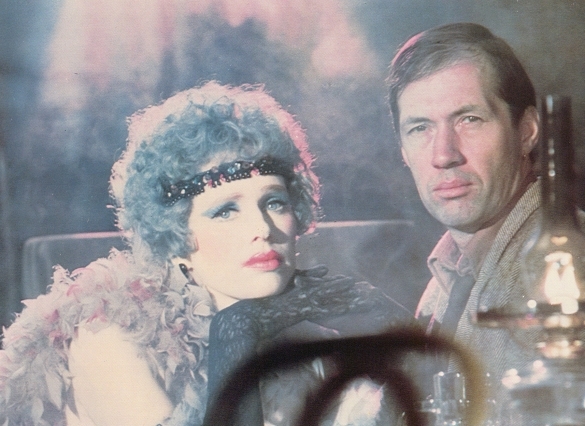
The director: Ingmar Bergman
The movie: The Serpent's Egg (1977)
Why so out of place in the director's filmography: A self-confessed "embarrassing failure" shot in a different country in a different language with a failed attempt at a different aesthetic approach.
Why the director strayed: Tax trouble in Sweden that sent Bergman packing to Germany and put him in a dark mood.
Scale of embarrassment for the director: These new aesthetic choices and the change in venue/language seems to have distracted viewers - and Bergman himself - from the fact that, thematically, The Serpent's Egg ties in with many of the director's best films. And the really silly stuff is nutty enough to be at least interesting. Even John Waters once wrote: "Except for Scenes from a Marriage, I still love Bergman (even The Serpent's Egg)." 2/10
His triumphant return to form: Although 1978 saw his initial return to Sweden and the release of Autumn Sonata, shot in Oslo, which teamed him with "the other Bergman" (Ingrid) and garnered international acclaim including Oscar nominations, the director would later calculate that the toll of the tax evasion charge cost him "eight years" of his professional life. But like Hitler, Bergman also recovered from his "colossal fiasco." Upon his full time return to his native country, Bergman artistically transitioned to television, from which his last great masterpiece Fanny and Alexander - the shorter version of which was released theatrically - materialized in 1982. Later he'd admit, "After the film's release, my life began to calm down; then I painfully realized the serious extent of my failure. Still, I do not regret for a moment making The Serpent's Egg; it was a healthy learning experience."
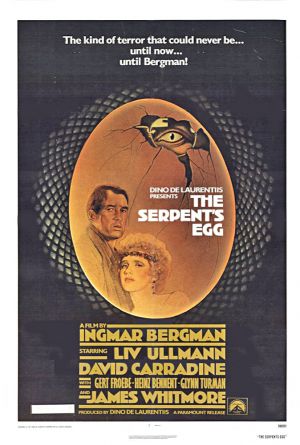
* The actress, Edith Heerdegen, was a favorite of prolific one-armed German director Alfred Vohrer.
** There's a minor connection here worth mentioning: before entering the mortuary, Bauer recommends Abel light up a cigarette to dilute the smell. When Abel first meets Hans in the movie, Vergérus reminds him that they smoked their first cigarette together. Later Abel when recounts his childhood with Hans he remembers the cat his former playmate coldly dissected, possibly the future evil scientist/film enthusiast's first work of "art."
*** Tarkovsky was more successful paying homage to Bergman with his final film The Sacrifice, which the director chose to set on Gotland (he wanted to shoot the film on Fĺrö but his request was denied by the government). He hired Erland Josephson to star in the film, Sven Nykvist to shoot it, Anna Asp (Fanny and Alexander production designer) to decorate it and Bergman's son Daniel as a camera assistant.
**** Dealing with the main character's Judaism is something Bergman never quite gets an angle on in Serpent's Egg, similar to a major flaw of The Touch in which Elliot Gould's David Kovac is also a Jewish American expatriate (an archaeologist). It is interesting that the sentiment "existence today is nothing but dread," which sounds a lot like a line from the film's super-pessimistic narration, is read aloud as anti-Jew propaganda. Bergman wouldn't write characters to be expressly Swedish Jews until Fanny and Alexander.
***** In Serpent's Egg, Ullmann seems to be playing a variation on her Shame character, complete with secretly selling herself to the "bad guy" (Colonel Jacobi in Shame, Vergérus in Egg) in order to survive. However Abel never gets the character reversal that von Sydow does in Shame - he's passive to the very end.
Related Articles
<<Previous Page 1 2 3 Next Page>>
home about contact us featured writings years in review film productions
All rights reserved The Pink Smoke © 2014